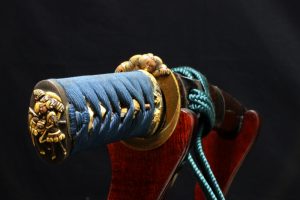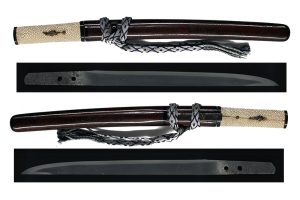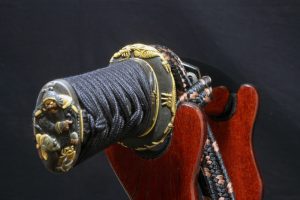説明
「刀姿 sword figure」
菖蒲造り庵棟、身幅重尋常、反り無し中鋒。茎は生で化粧鑢がかかり、茎尻は入山形。
「彫物 carving」
彫物は両チリの棒樋が、鎺下に搔き流しとなる。
「地鉄 jigane」
地鉄は板目肌が流れ柾かかり、地沸付く。
「刃紋 hamon」
刃紋は互の目乱れ、刃縁沸が付き砂流しかかる、刃中は金筋が働く。釯子は刃紋成りに入り小丸に返る。
「特徴 detailed」
濃州住兼信、本名は丹羽脩司、明治36年生まれ、師は父の兼延。昭和15年に小倉陸軍造兵廠の受命刀匠第一号となり、新作日本刀展において金牌を授けられ、昭和18年には造兵廠より技術賞を受けるなど高く評価される。戦後は、昭和42年に作刀承認を受け、自家製鉄を行い四方詰めによる造り込みを善くし、大和伝とりわけ手掻や大和志津を研究しました。ご子息は兼信(丹羽清吾)を襲名し活躍されています。
本作、珍しい菖蒲造りの短刀です。刀身、合口拵共コンディションは良く、お守り短刀に最適です。
Nōshū-ju Kanenobu, whose real name was Shūji Niwa, was born in 1903 (Meiji 36). He studied under his father, Kanenobu (Kanenobu I). In 1940 (Showa 15), he became the first officially appointed swordsmith of the Kokura Army Arsenal and was awarded the Gold Medal at the New Japanese Sword Exhibition. In 1943 (Showa 18), he received the Technical Award from the Arsenal, reflecting the high regard for his craftsmanship.
After the war, in 1967 (Showa 42), he was again authorized to forge swords. He produced his own steel and excelled in the shihō-zume forging method, focusing on the Yamato tradition—particularly the Tegai and Yamato-Shizu styles. His son succeeded him under the name Kanenobu (Niwa Seigo) and continues the lineage.
This piece is a rare shobu-zukuri tanto. Both the blade and the aikuchi-style koshirae are in excellent condition, making it an ideal omamori tanto (protective or talismanic dagger).
「拵 Koshirae」
ハバキ(habaki) :銀無垢一重の腰祐乗。
縁頭・鐺(futikasira・kojiri):素銅石目地。
柄(tsuka) :鮫は親粒が付き出し鮫。
鞘(saya) :焦げ茶石目。
「刀剣の状態 condition of blade」
研:良好です。
傷:欠点に成るような傷は有りません。


























